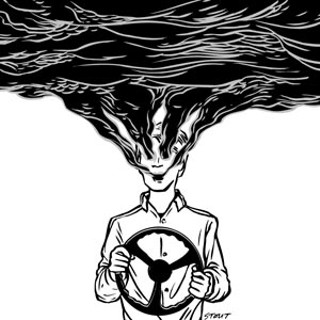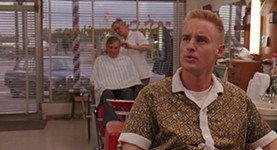Letters at 3AM
The million mile commute
By Michael Ventura, Fri., June 10, 2005

Smoking a cigarette in the parking lot of a Super 8 motel somewhere in the West. Across the street, Ronna's Video for Adults – Private Video Booths – Open 24 Hours. It's about noon, a chilly day. An old car and then a new car pull up at Ronna's. Out of each, an average-looking guy gets out and walks quickly into the joint. Private Video Booths. What loneliness. Jerking off to porn in a closetlike space on your lunch hour, then going back to work. Or maybe you told the wife you were going to the store (one of the guys was older, probably retired). And who wants to imagine how those booths smell?
Beside Ronna's, an old motel has been converted into cheap apartments. You know they're cheap because the cars outside are little tin-can putters – just enough of an automobile to get you to and from work, where you make just enough or just less-than-enough to keep the car running and live in the cheap apartment, with its minimal construction, thin walls, and scant insulation. A phone, a bed, a little table, a TV, probably a microwave and a waist-high fridge. Car-engines revving at Ronna's next door 24 hours a day. And the constant sound of the highway, tire-rasp on the pavement, trucks rattling the windows, motors, motors, motors.
Next door to the motel, a KFC chicken joint, cars idling at the drive-through window, engines puffing. The parking lot smells of KFC grease. The motel halls and rooms smell of KFC grease.
The motel, the KFC, Ronna's, the cheap apartments a few miles from town, and me, about 4,000 miles into a long, roundabout, 10-weeks-and-8,000-miles journey – one tableau of what it means to live in the Age of the Car.
I asked a high school class what was the most important human invention in their lives. Almost with one voice the class said, "Computers!" I said, "Naw." They argued fiercely about the importance of the computer, the Internet, how it's reorganizing everything. I said, "Naw." They started to wonder if it was a trick question. "I don't do trick questions, you know that." Finally I said, "How did your computer get to the store where you bought it? How do your parents get to work? How do you get to school? How does every single thing you wear and use get to where it is? By computer? No, my beauties. By car and truck. The most important invention in your life is the internal combustion engine, encased in steel and fiberglass, propelled by oil and various chemicals, sold by any means necessary, and insured to the hilt. Imagine your life without self-propelled vehicles fueled by gasoline. There would be no suburbs. There would be no air transport. No goods would be delivered by truck. It would take days to traverse where now you can go in an hour. Your life is your life by virtue of car and truck. If computers disappeared it would be a major hassle – we'd have to adjust to living as we lived 10-15 years ago. But if the internal combustion engine disappeared, in many ways we might be living as we lived a century ago."
Like most of us – me too, usually – the class had taken the automobile for granted the way fish must take water for granted. The automobile is just ... there. Everything is organized around the fact that it's there.
I'm writing this nearly 2,000 miles down the road from Ronna's and that Super 8, in a nearly identical Super 8 on the edge of Lake Superior near Duluth, Wis. What a fantastic assumption, utterly new in human experience: that I can go anywhere on this vast continent, and anywhere I go there'll be a fairly cheap, decent place to sleep, an OK place to eat, a Staples to buy fresh yellow pads to take notes on, a Circuit City to replace the surge board I forgot in the last motel – and highways filled with people not unlike me, going from here to there, mostly alone, separated from each other in encased vehicles. We take it so for granted, yet people have been living like this only in my lifetime, and, when this era exhausts itself, people may never live like this again. What will they think of us, I wonder. Will they think us lucky? Will they think us unbelievably unrooted and frantic? Incredibly wasteful? Amazingly free? All of the above?
In the magazine DESIGNER/builder (July-August, 2004), my friend Stanley Crawford wrote a stunning piece titled "Driver's Ed: A Million Miles Later." He figured he'd driven about 20,000 miles a year, "probably typical ... for most westerners and rural and suburban residents" – a million miles in his lifetime. Then he did the math. His conclusions are startling and deserve to be quoted at length:
"I have owned cars and pickups whose fuel consumptions ranged from 11 to 50 miles per gallon. At 25 miles per gallon, my likely average, I burned 40,000 gallons of gas and diesel over the course of one million miles. ... A million miles requires 250 oil changes adding up to 300 to 400 gallons of oil, plus fifty transmission-fluid changes, another 50 or 60 gallons of fluid. I have worn out some 133 tires, assuming I have averaged 30,000 miles per tire. ... My cars have required batteries every five years on average, for a total of 100 (I have usually owned two cars at a time), weighing about two tons. In antifreeze, add another 100 to 200 gallons. ... Assuming most vehicles can reach 200,000 miles with reasonable care before being junked, I've been responsible for the manufacture of five cars or about 20,000 pounds of steel, glass, plastic, paint, and other materials, for which I have paid approximately $140,000, plus another $10,000 in interest. Another 400,000 pounds of fuel and resources were used up in the production of those five new cars. I estimate that repairs and maintenance, some of which I am able to do, have cost $500 a year each for my vehicles, or $50,000. In my fifty years of driving with no serious accidents I have paid $60,000 in insurance. ... Those are back-of-the-envelope figures we million-milers might more or less agree on.
"In sum, my out-of-pocket costs for my million miles will be in this range: Cost of vehicles, including interest: $150,000. Gas, oil, fluids: $50,000. Repairs, including tires, batteries: $50,000. Insurance: $60,000. Total: $310,000."
Calculating from his own more-or-less average driving-life, Stanley estimates we spend about "twelve years of eight-hour-days driving our one million miles, assuming we have averaged about thirty miles an hour." Gasping at that, I did some rough numbers: We work eight-hour-days from, let's say (for college graduates), 25 to 65 – 40 years. Add 12 years of eight-hour days driving, and that comes to: 52 years of eight-hour days driving and working. For people who work straight out of high school, 59 years.
It's hard to imagine that anyone in the future will admire that. Or be nostalgic for it. Or think we were anything but out of our minds.
Yet, Stanley continues, "this is just the beginning. Every automobile generates costs which are externalized out into society and the environment. ... Tailpipe emissions are a major source of air pollution. Our cars contribute about a pound of carbon per mile toward global climate change. To a lesser degree they distribute particulate matter from brake shoes and pads and metal parts and tires. ... The effluvia from leaking oil pans and transmission and power steering and bearing seals and grease fitting and radiator hoses and the soluble portions of asphalt pavement itself pass into storm drains and foul waterways and beaches. ... As automobile users, we will be billed for some of these costs through taxes and the health effects on ourselves and our families, but on the whole most of them will be passed on to the environment, which will ultimately bill us in other ways." Plus: "A large portion of our income tax payments goes toward covering the cost of wars and other military expenses needed to keep sea lanes open to support repressive oil-producing regimes in order to maintain a reliable supply of petroleum. Our right to drive is assured by the largest military budget and the best-equipped military force the world has ever known." For many of us, "in the act of driving we vigorously oppose everything else we believe in."
Back at Ronna's (Open 24 Hours), someone has just pulled into the parking lot to sit in terrible loneliness in a Private Video Booth. He will leave Ronna's, still terribly lonely and just as isolated, in his incredibly wasteful private transportation booth. A few more miles of a million mile commute. He is one of us, desiring, wasting. He is our brother, for the future will make no distinctions among him and me and you, desiring, wasting. ![]()
Stanley Crawford's novel Petroleum Man has recently been published by Overlook Press. His prophetic classic Gascoyne, long out of print, will soon be reissued.










